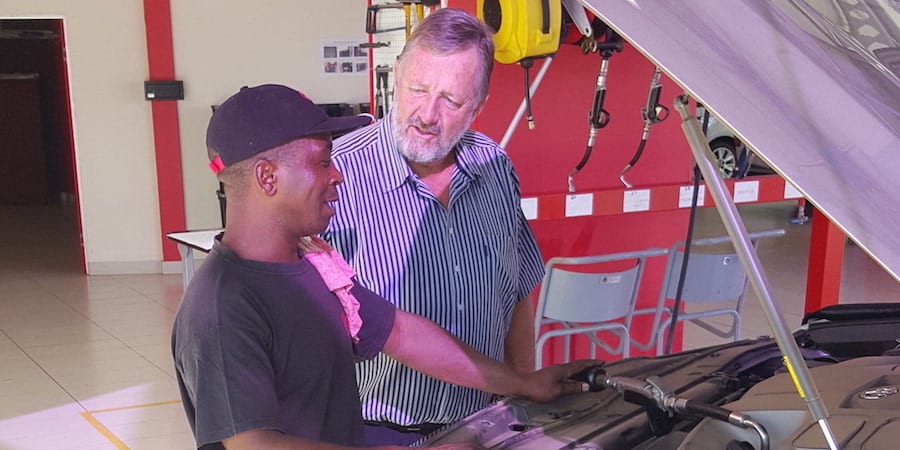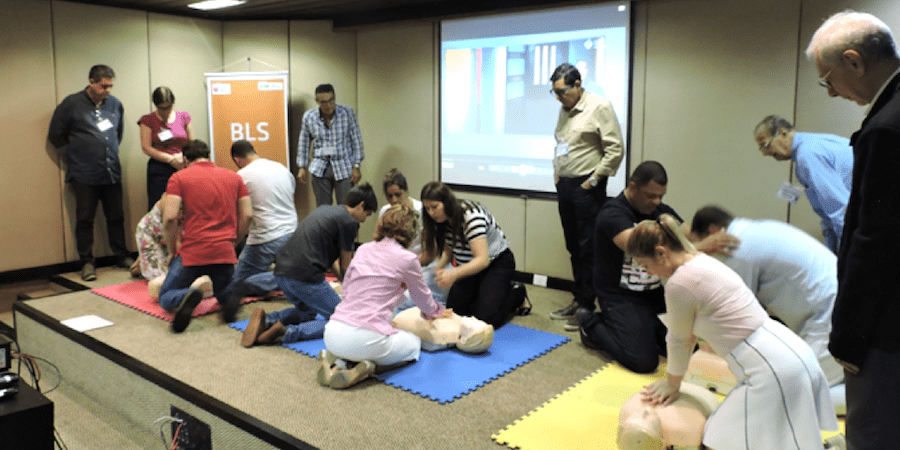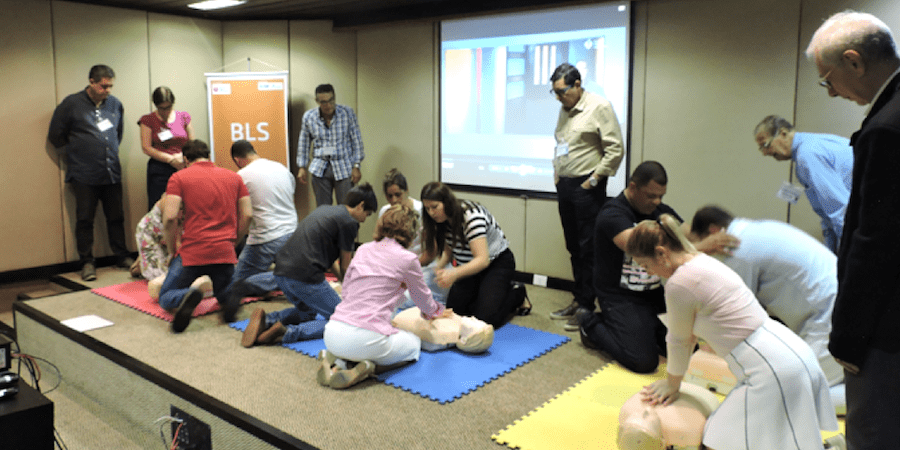
Terry O'Donoghue brings lean management to car dealerships
PROFILE - Three decades in Toyota South Africa and an ability to see the value stream as a whole are helping Terry O'Donoghue, COO of Halfway Toyota, to bring lean thinking to a chain of car dealerships.
Profile on: Terry O'Donoghue, Chief Operating Officer, Toyota Halfway
Words: Roberto Priolo, Editor, Planet Lean
There is a lot of talk in the lean world about the importance of “seeing the whole” and learning how to look at processes end to end. Of all the lean people I have met over the years, few have had the opportunity to work in and come to know as many parts of a value stream as Terry O’Donoghue has.
Today O’Donoghue is the COO of Halfway Toyota, a South African chain of dealerships that he joined in 2011 after spending 30 years at Toyota South Africa in a number of different roles.
His career with the car manufacturer started in 1980 as a computer programmer. “I had no real interest in the motor industry,” he admits flat out at the beginning of our conversation. Considering O’Donoghue ended up staying at Toyota for three decades, this was quite surprising to hear.
Over the years, his role within the company changed several times. At first, O’Donoghue kept working as a programmer in different departments (After Sales and then Finance), but before long he started to gradually and seamlessly move away from programming.
“In the first few years, it was a case of going to a department to ensure the IT system that I had built and therefore knew how to use was in fact cross-functional and working as expected. Sadly, despite our efforts the operational side of the business never took it on. It came from the Finance department, after all,” O’Donoghue recalls, with a chuckle.
By the time he left Finance for Business Planning, he wasn’t a programmer anymore. That was the start of the journey that led him to Marketing and Demand Planning and then to spend a few years at the company’s manufacturing plant in Durban – in Distribution, then Exports, then Production Planning and Control – until he eventually became Vehicle Supply Chain Director.
His goal then was to apply TPS principles to the whole value stream, and the new position was his best shot to succeed. “When we tried to do it from Finance we failed. Until I got to the operational end of the business, the system was always playing catch-up and didn’t deliver,” O’Donoghue comments, “We had come up against the gap between the daily operational planning and the six-month horizon of forecasting.”
Running supply chain (which meant working across the company rather than in discreet pockets) gave O’Donoghue the opportunity to influence things more directly: a lot of inventory was removed and the company gradually went from monthly planning to two-week planning, down to weekly planning and eventually to daily planning. Driving the integration of demand planning and production scheduling and removing the buffer was where the organization reaped the biggest benefits (which included freeing up a lot of cash). “At last we were using the IT system I had created 10-12 years before. I then realized why it hadn’t work when we had tried to implement it while sitting in Finance. That was not a daily operation!” O’Donoghue comments.
In 2000, Toyota Motor Corporation bought the majority shares in Toyota South Africa, and the culture in the factory changed completely (together with its performance). “TPS came alive and people really started to live and breathe its principles every day,” O’Donoghue says. Those are the ideas he grew with, first through his work in vehicle distribution and then in After Sales (where he spent his last five years at Toyota).
The continuous application of TPS principles gave O’Donoghue a greater understanding of how dealerships work, not just from the parts side but also in terms of support of technical operations and integration of parts into the support of service.
“During those years, I spent a lot of time trying to encourage the dealers to take TPS seriously, telling them that it works and that standardization is the key. Once again, I was trying to extend the adoption of TPS ideas to the whole value stream (of which dealerships are a critical part) and eliminate the silo thinking that was exposing our customers to uncertainty, but dealers didn’t seem interested,” O’Donoghue says.
LEAN IN RETAIL, AT LAST
O’Donoghue retired from Toyota in 2010. Four months later, Halfway Toyota (a group of dealerships in South Africa and Botswana) asked him whether he could help them to implement lean thinking. He recalls: “‘We can take TPS to retail and and make it work,’ I told them. I had had a fairly long relationship with the owner of Halfway. He was one of the more thoughtful leaders. His dealerships had become something of a testing ground for me, for a lot of things I was trying out in manufacturing and that I needed a dealer’s input for.”
Despite encountering quite a lot of resistance after he started as a part-time consultant at Halfway, O’Donoghue was determined: he wanted to develop each of the 1,460 employees across the 12 Halfway sites and make them all problem solvers. He admits that progress has been slow: “The devil is in the detail. If you don’t get to the detail, you won’t achieve a transformation. Our main challenge is still that of developing problem solving capability at the front line. We have pockets of excellence and great examples, but in terms of sustainability… we still have a long way to go. There is still not enough repetition and consistency in driving change through. We need to become more obsessed with quality.”
For the first year, visualization is all O’Donoghue focused on at Halfway. He comments: “Given how much work we had to do we knew we had to accelerate or we would all be dead before we were finished. So in 2012 I went from part-time to full-time and assumed the position of COO. At first, I helped people see the gaps through visualization and then we focused on those gaps and what to do about them.”
At the time, O’Donoghue was using the Lean Enterprise Academy’s (LEA) publication Creating Lean Dealers (one of its authors, Dave Brunt, has been supporting Halfway’s transformation since 2011) as a reference. Before leaving Toyota SA, he hadvisited Jaeger, a Toyota dealer in Bergen, Norway that have been an LEA co-learning partner since 2007 to see clearly an example of a retail dealer who had applied lean to the aftersales operation. The following year he went back with the owner of the Halfway Group, George Baikie.
BEING A TRUE LEAN LEADER
When I ask him what the biggest lesson he learned at Toyota is, O’Donoghue stops to think for a moment, takes a deep breath, and says: “There are a couple. One is that batching is evil! It allows bad things to happen. But I think that the most important lesson, and the one that took me the longest to learn, is that your job as a leader is to develop people and make them problem solvers.”
He goes on to explain how he spent a lot of time working on alignment at Halfway, and how he was almost more interested in that than in the application of TPS principles at first. “Alignment clarifies purpose, establishes dialogue and helps you to understand people’s lives and problems. That was the angle that made TPS make so much more sense,” he says.
According to O’Donoghue, what he learned working in different departments at Toyota over 30 years is really helping him to try and bring change to 12 different dealerships today. “This is a complex and intense industry and it has certainly given me quite an advantage to have as wide an exposure as I had within Toyota,” he says. Thanks to the body of knowledge he gained by working across the whole value stream, today O’Donoghue can move easily across departments in the dealerships. He knows the processes and, more importantly, the problems that people encounter on a daily basis.
And it is on people that the last part of our conversation focuses on, as O’Donoghue extracts a booklet from the pocket of his green waist-coat. It’s by Etsko Schuitema, a leadership theorist born to a family of miners in South Africa’s North West province. Although O’Donoghue also comes from a mining area, I suspect that’s not why he is so fond of Schuitema’s ideas. “Your legitimacy to lead comes out of the care you have for the people that report to you, and the responsibility you take for their growth. And you don’t do this to get something in exchange, but because it is good in itself,” he tells me, almost solemnly. “This approach resonates with lean thinking and the idea of capability building, and because people development is altruistic and not a direct exchange, it gives you the legitimacy. You then go through incremental suspension of control, as people get more autonomy. This is what I am after at Halfway.”

Read more


FEATURE – Is your organization process-oriented or results-oriented? The fourth article of Hazards on the road to lean looks at what happens when you focus on the what, but not on the how.


FEATURE – To boost the “adoptability” of Lean and sustain it over time, it’s necessary to develop institutions that support our improvement efforts without making processes more bureaucratic.


OPINION – The rise and fall of organizations does not depend on chance or bad luck. It generally stems from a fundamentally flawed strategic approach that fails to define a purpose, alienates workers and ignores customers.



INTERVIEW – A cardiologist from a hospital in Salvador de Bahia explains how his department was completely transformed following the introduction of a dedicated pathway for heart patients.

